| Advertorial
Achieving MDG: Perspectives and Need for a National ECCD Policy
Plan Bangladesh organized a roundtable discussion on Early Childhood Care and Development (ECCD) on 13 September, 2008 where distinguished members of government and civil society were present. The discussion was moderated by Dr. Syed Manzoorul Islam, Professor of the Department of English, Dhaka University. Channel i and The Daily Star were the media partners for the event. Excerpts from the roundtable are given below:
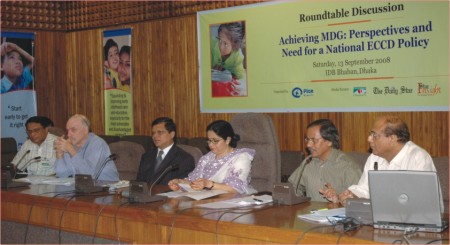
Selected Discussants:
1. Rasheda K. Chowdhury, Adviser, Ministry of Primary and Mass Education, Ministry of Women and Children Affairs, Ministry of Culture.
2. M. Musharraf Hossain Bhuiyan, Secretary, Ministry of Primary and Mass Education
3. Hasanul Haq Inu, President, Jatio Samajtantrik Dal - JSD
4. Edward Ned Espey, Country Director, Plan Bangladesh
5. Dr. Manzoor Ahmed, Sr. Advisor, Brac University Institute of Development (BUIED) & Chairperson, Bangladesh ECD Network (BEN).
6. Mohammad Mohsin, Regional Advisor, Early Childhood Care and Development, Plan Asia Region.
7. Khandaker Shawkat Ali, Research Fellow, Power and Participation Research Centre.
8. Professor Dr. Abdul Hannan, Executive Director, Institute of Child and Mother Health, Matuali, Dhaka
9. Md. Nuruzzaman, Project Director, Early Learning for Child Development Project, Bangladesh Shishu Academy
10. M. Habibur Rahman, Director, Education sector, Save the children.
11. Ehsanur Rahman, Executive Director, Dhaka Ahsania Mission
12. Dr. Jena Hamadani, Head of Child Development Unit, ICDDR,B
13. Flaurie Storie, Sr. field program Manager, Aga Khan Foundation
14. Saiful Islam, Program Support Manager (Strategy), Plan Bangladesh
15. Liakat Ali, Program Support Manager (Operations), Plan Bangladesh
16. Probak Karim, Learning Advisor, Plan Bangladesh.
17. Mahbubul Alam, Director Program, Diganta Television (Ex. DDG, Program, BTV)
18. Md. Azizul Haq, Director-in-charge, CAMPE.
19. Faruk Hossain, Writer and Deputy Secretary, GoB
20. Farida Akhtar, Chief Executive, Inner Force
21. Hamida Ali, Principal, South Point School and College, Former Principal, Viqarunnessa Noon School and College
22. Suraiya Haque, ED, Phulki
23. Dr. Mehtab Khanam, Counsiling Psychologist. Moderator : Dr. Syed Manzoorul Islam, Professor, Department of English, Dhaka University.
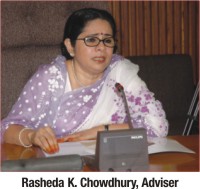 Rasheda K. Chowdhury: Rasheda K. Chowdhury:
The honorable adviser said that recently there has been a lot of interest and articulation on early childhood education. She hoped that through these kinds of discussions clear guidelines could be formulated on short term or long term basis. She also mentioned that that there is still lack of conceptual clarity on ECD (early childhood development), ECC (early childhood care) or ECCD (early childhood care and development). Whether ECD is pre-school or 0-5 exactly needs to be addressed. She mentioned that people fall in circles of discussion on operational framework and academic information and from that no certain plan comes out which can be sustainable. Till now, the existing plans are either ad hoc or project-based.
She also raised the issue that early childhood education has been continuing for a long time. In 1978 when the first study “Situation of Children of Bangladesh” was conducted under the leadership of Professor Shamsul Haque, in which she was involved. From that time on this issue came in various plans, discussions, seminars etc. She also said that the matter could not be resolved in a coordinated manner and this government is trying to do just that through an ECD policy. The government's attempt is to identify various points and issues from various stakeholders.
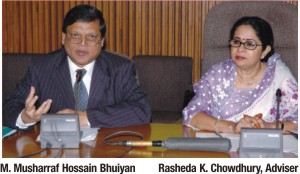
She also said that this is a sector where it is not possible to progress without public-private partnership. She stressed the need for capacity building since ECD is a specialized area. The adviser also talked about the need to understand the difference between income and social poverty, since social poverty in Bangladesh especially in terms of ECD is very high. She thanked Plan Bangladesh for organizing the timely and a fruitful roundtable discussion.
Saiful Islam:
Mr. Islam talked about the increasing importance of early childhood care and development as far as human development is concerned. He said that the early childhood care and development interventions does not reach the major segment of the population. Only about one-fifth of the children of Bangladesh have access to these services. He said that this is a huge threat to achieving our development goal, which calls for an appropriate national policy to be created to ensure access to all, especially for the poor and the disadvantaged section of the society.
He said that child nutrition, access to a stimulating environment and education, appropriate parenting education are all important component of ECCD. Government has incorporated early childhood care as one of the major objectives of the national plan for action (2002 2015); both in the formal and non-formal sub-sectors which emphasis on family and community based programs. Although the arrangement for baby class has been recognized by the government in the public schools, ECCD remained as a weak area in government program.
He mentioned that a working group has been formed by the Ministry of Children's Affairs to formulate a national ECD policy, and hoped there will be adequate consultation with all concerned groups in order to make the policy comprehensive. He stressed the need for popularizing ECD in the country.

Dr. Manzoor Ahmed: Keynote Speaker
The keynote speaker said that in his long experience of working with children at UNICEF, what he had learnt is that the early stages from pregnancy to the first five years or eight years is exceptionally important. What happens in this period really determines what happens later on in life.
He also said that there is a great interaction between health, nutrition and psycho-social stimulation. One or the other needs that support; the interaction of the other remaining elements and sum total of all these is something greater than the arithmetic sum of these. He mentioned that studies have shown that a dollar invested in childhood development gives 20 and even 30 times the return in adult life in many different ways. He also stressed the need for conceptual clarity and said that the approach should be comprehensive.
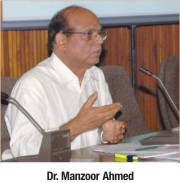 He said that human intelligence is distributed in a kind of a normal bell shaped curve which means that if a measurement of IQ is taken, the large majority are in the centre (about 68%) more than 2/3 comes close to IQ 100 and the further out we go, the lower the numbers are. But the further out we go, the more exceptional the results are in terms of IQ, meaning that the last strata are geniuses, about 2% of the hundred and fifty million people of Bangladesh could be highly talented. And then about 0.3% would be even more exceptional and could win the Nobel prize and make exceptional contributions to the growth of civilization. If these numbers are interpreted, it means that there are about fifty lakh people with exceptional intelligence in the Bangladeshi population, assuming that IQ is normally distributed amongst the population. He said that such human potential is something that cannot be attained without early childhood development. He said that human intelligence is distributed in a kind of a normal bell shaped curve which means that if a measurement of IQ is taken, the large majority are in the centre (about 68%) more than 2/3 comes close to IQ 100 and the further out we go, the lower the numbers are. But the further out we go, the more exceptional the results are in terms of IQ, meaning that the last strata are geniuses, about 2% of the hundred and fifty million people of Bangladesh could be highly talented. And then about 0.3% would be even more exceptional and could win the Nobel prize and make exceptional contributions to the growth of civilization. If these numbers are interpreted, it means that there are about fifty lakh people with exceptional intelligence in the Bangladeshi population, assuming that IQ is normally distributed amongst the population. He said that such human potential is something that cannot be attained without early childhood development.
In regard to the development of the human brain in the early stage, he added that according to Dr. Kamrul Hassan who is a pediatrician at Apollo Hospital, there are a hundred billion cells in a human brain and all these cells are actually already there in the human brain at birth. That's why the pregnancy period is very important. The cells are already there at birth and after birth there is an intense activity of the brain about up to five years, which are connections between the cells into specialized areas. The cells are already there so the synapses and the connections between cells make it possible for human beings to respond to the environment and do all the things that they do. At 14 years the synapses of the connections are about 100 trillion to 1000 trillion. He established the point that up to five years, the development of a child is extremely critical.

He said that the key needs for a child's growth is nutrition, healthcare, love, affection, social and mental stimuli, and learning opportunities. He added that in order to achieve the MDGs and to reduce poverty and ensure primary school completion of girls and boys, the government and civil society need to work together and expand a qualitative and cost effective early child development policy.
He also added that without a national ECD policy that ensures proper early development of a child, we are at a serious risk of raising a whole new generation who are cognitively impaired.
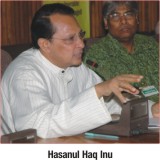 Hasanul Haq Inu: Hasanul Haq Inu:
Mr. Inu said that there are things to think about even before the birth of the child. Nutrition of the pregnant mother and healthcare facilities has a great impact on the development of the child.
He said that the budgetary allocation in the last ten years for health and education shows a downward trend, which is a very unwanted situation. ADP program allocation at the primary education program also fell down to 1% of the total ADP. Absolute allocation increased but the percentage of the ADP was 65.81% in 1993-94, and went down to 46.6% in 2003-04.
He added that the national policy should also take into account the existence of indigenous and challenged children, and children that belong to minority groups. He stressed that utritional development.
investment in human capital is always profitable and that we need to invest more in education, training, health and nutritional development.
He said that starting a baby class without appointing any teachers and without formulating any curricula was a blunder. He said that it is unfair and discriminatory to create three or four classes of children. He stressed the need for a universal system of education in Bangladesh.
Khandakar Shakhawat Ali, Research Fellow, Power and Participation Research Centre
He mentioned that two months ago PPRC formulated a policy paper sponsored by Plan. He pointed out that in the last 28 years, ECCD in Bangladesh progressed step by step, but in the last five years it made noteworthy progress, in which Plan played its catalytic role. Two investments were made by Plan in ECCD; one is that from the knowledge perspective, they made a big investment in BU-IED and the other on PPRC. The investment with PPRC, though small, was an effort for sociological engagement to make ECCD accepted at grassroots. Because of these two documents are produced - a policy paper by PPRC and the other 'operational framework on ECCD' jointly from BRAC University and the government. In reference to these, today when we are discussing targeting MDG, we can put where ECCD currently stands and where we should go.
The challenge of ECCD is mainly in implementation. The interface or connection of ECCD with quality education is understandable to parents, students, teachers, education administrators, education policy makers etc.
In PRSP along with the National Plan of Action states that ownership of ECCD will be of the community, local government and NGOs. In this area, some extraordinary works has been done by Plan Bangladesh in Khansham; similarly BRAC, Grameen Sikkha and Dhaka Ahsania Mission are doing in other places. These learning of related to implementation of ECCD can be brought in the policy level. So I would you all to consider local experiences of the NGOs be considered while developing the policy. While presenting the PPRC policy paper, we could able to make the Advisor of the local government understand that the champion of this program could be the local government.

M. Habibur Rahman:
Mr. Rahman said that the ECD should be for children between 0 to 8 years. He then subdivided this within the following: 0-3 for early learning, early stimulation including impression programme, then 4-5 for pre-academic or pre-school, and 6-8 for the transition programme in which children will be upgraded to primary stage. He said that three ministries should lead the three groups and that the ministry of health should be closely involved with all three stages.
He also added that the government can create a policy through which Corporate Social Responsibility activities will be directed towards ECD programs. He said that investing in ECD will help to ensure quality primary education.
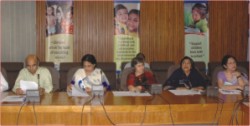 Faruk Hossain: Faruk Hossain:
Mr. Hossain said that he feels that the Ministry of Health, Women's Affairs, Social Welfare, Ministry of Food for Food Security, Ministry of Local Government for community schools programs under city corporation, Ministry of Sports for sports policy for children, and Shishu Academy all need to be consulted in the formulation of an ECD policy.
He added that all relevant organizations need to work in a coordinated manner on this issue. He stressed the need for commitment from politicians and a strong lead agency for proper implementation of ECD.
Md Nuruzzaman:
Mr. Nuruzzaman said that although the primary school enrolment rate was 100% till now, the rate of completion of primary education is only 52%. The dropout rate is 48%. He said that the only way a 100% successful primary education completion can be ensured is by creating and implementing an effective ECCD policy. He also said that the government is already operating ECD and Shishu Academy leads the committee in charge of it. He also added that a draft policy is currently underway.
He stressed the need for a large media campaign to raise awareness and create demand for ECD.
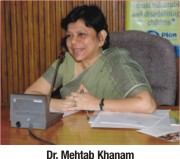 Mehtab Khanam Mehtab Khanam
Professor Mehtab Khanam emphasized on the play, games and socialization of the children. She spoke highly of the Sisimpur program in the Bangladesh Television where she is involved. Through such programs media can play a vital role in shaping the personalities of the children, help learning the basic literacy and numaracy. Citing the example of the some advertisement in the television, she commented of that narrowness, commercialization of the business is key in these advertisements, not building the character of the children. She said that Our's is adult oriented society, child unfriendly media, exploiting the fact that honesty is the beauty of a child. ECCD is a challenge. We need to comprehend properly what is ECCD.How many of us know about parenting? Teachers are role model; and in ECCD it is more so. As of intelligence she raised the question -what about social and emotional development. People now a days are getting educated but their social skills remain undeveloped. As a result we are low in self esteem and problem solving. She thanked Plan for such policy discussion on ECCD.
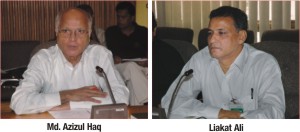 Mahbubul Alam: Mahbubul Alam:
Mr. Alam said that children's affairs are not limited to children rather falls into an integrated coordinated approach. He feels the need of NGOs and all other interested organizations to work with the government.
He said that the biggest element of making ECD popularized is to create mass awareness on the issue. He talked about Sisimpur, a children's programme on television, and how it aids a child to develop. He stressed the need for coordination amongst those who are willing to take initiative and are currently working in the field.
He added that the electronic media has become a force parallel with the government and NGOs and said that it should not be kept limited to political reform but should be used for nation building and exploration.
Probak Karim:
Mr. Karim said that the concept of ECD needs to be popularized and should not be too technical. He stressed the need for ensuring participation of the general people during the national ECD policy formulation.
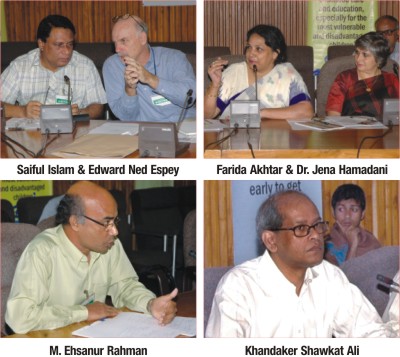
Mosharraf Hossain Bhuiyan: Special Guest
The special guest said that usually care comes as a component of education and the main thing is education in which care is only a part. But he feels that ECCD (Early Childhood Care Development) or ECD (Early Childhood Development) is a vast thing and education is a part of it.
He also stressed the need for political commitment, and mentioned that there should be a reflection between the allocation and reallocation of resources otherwise it shows that the political commitment is not very strong. He said that ECD deserves more national priority and therefore more resources need to be allocated to ECD.
He added that MOPME has a plan of action, which is a policy document and it talks about ECCD. He stressed the need for stakeholder coordination for policy update, curriculum development, and different methodologies needed for monitoring the indicators, since updated and relevant statistics is very necessary.
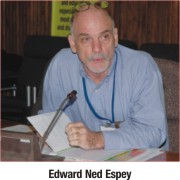 Edward Ned Espey: Edward Ned Espey:
Mr. Espey said that Bangladesh's young population needs a lot to offer, and they will flourish if given the right opportunity.
He said that the media in Bangladesh is not at all friendly for the growth of a child since most of the programs and advertisement are focused towards a grown up audience. He stressed the need for coordination amongst relevant organizations, not as independent members of the government or as NGOs, but simply as resources each of them represent, bringing together the human resources that are necessary.
Mohammad Mohsin
As the Regional Advisor for Early Childhood Development in Asia of Plan International, Mr. Mohsin is privileged to observe the policy options of other countries for ECCD. He mentioned that, almost all other countries are well ahead of Bangladesh in terms of a holistic ECCD policy framework. Citing example from India, Sri Lanka, Pakistan, Nepal, Philippines and even the vast country of China, he informed that these countries have on principles accepted the integrated nature of early childhood, outlined the policy framework, consulted widely and approved at the highest level of the government. A policy for the well conceived program obviously needs political commitment and resources mobilization accordingly. In Bangladesh, only in last March, the government has approved Preschool framework which, is a part of the ECCD. The overall policy framework is under process, lead by the Ministry of Women and Children Affairs. However, it is important for the policy to have clear concept of the early childhood, area and scope and the opportunity, services provisions etc. The countries cited above, have institutionally placed the importance of ECCD in the government structure, for example, the ECCD authority in Sri Lanka, Integrated Child Development Scheme (ICDS), the mega program in India. Even if we can not immediately create the separate ECCD department or authority, overall child development issues to be looked into from holistic points and in a joint efforts of the Ministries'/agencies of Education, Health, nutrition, social service, water and sanitation etc.
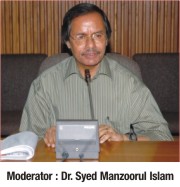 Citing the recent development in Bangladesh, he said that we need to document the good practices we have. Plan Bangladesh, Save the Children, Brac, Dhaka Ahsania Mission, Grameen Shikkha and almost some 200 organizations are operational for one or another kind of ECCD interventions. With support from Plan, a resource centre has been established in the BUIED which is a collective resource of different stakeholders which houses enormous information. Citing the recent development in Bangladesh, he said that we need to document the good practices we have. Plan Bangladesh, Save the Children, Brac, Dhaka Ahsania Mission, Grameen Shikkha and almost some 200 organizations are operational for one or another kind of ECCD interventions. With support from Plan, a resource centre has been established in the BUIED which is a collective resource of different stakeholders which houses enormous information.
He concluded with the remarks that ECCD cannot be initiated or run only by the government or by the corporate sector and that the parents need to have a big contribution here as well. Initiatives can be collaborative and management responsibilities can be shared such as the recent example of NOKIA, Plan China and the Chinese government..
The event was managed by Trital Communications. (tritalcom@yahoo.com)
Copyright
(R) thedailystar.net 2008
|
